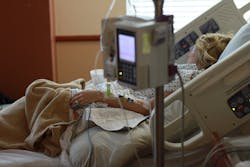Shedding light on a decades-old controversy, scientists at the Medical University of South Carolina (MUSC) and University of California at San Diego (UCSD) published findings in PLOS Genetics this month showing that autophagy or “self-eating” genes work against tumors in certain types of ovarian cancer.
Autophagy is a cellular recycling pathway that scientists believe plays a role in cancer resistance to stresses such as chemotherapy.
The scientists found that autophagy genes also act to prevent tumor formation. This finding, validated in mice, helps to resolve a decades-old controversy based mostly on cells grown in plastic dishes, said Joe Delaney, Ph.D., a researcher at Hollings Cancer Center, who was the MUSC faculty lead on the study. Delaney teamed up with colleague Dwayne Stupack, PhD, in the division of gynecologic oncology at UCSD.
The research centered on two autophagy genes: BECN1 and LC3B. Every person has two copies of these genes: one coming from each of their parents. One copy of BECN1 is lost in one of four breast cancers and three of five serous ovarian cancers. This is unusually frequent for a tumor- suppressor gene. BECN1 has been controversial, since it is rarely mutated, and even when it is lost, it is often lost with its neighbor, BRCA1. Some scientists believe that BECN1 deletion is a coincidental event, Delaney said.
However, previous studies in cell culture hinted at tumor-initiating characteristics when BECN1 was suppressed, prompting the current study.
Delaney and Stupack performed the same partial deletion found in patients, one of two BECN1 alleles in mammals, in this mouse model. Delaney said the results were immediate and conclusive. The very first BECN1-suppressed mouse enrolled in the study had a sizeable tumor at three months of age.
Years of research then went into the investigation of why BECN1 single-allele deletion acted as a tumor suppressor. Using the mouse tumors and human ovarian cancer cells within the lab, the team of 15 researchers tested multiple phenotypes to determine why autophagy gene deletion leads to cancer.
The authors suspected cellular metabolism to be one of the strongest effects following the disruption of this recycling pathway. Ultra-performance liquid chromatography mass-spectrometry metabolomics were performed on human ovarian cancer cells with reduced autophagy genes. Surprisingly, little metabolism was changed. Instead, ovarian cancer cells seemed to delete BECN1 to increase the tumor’s ability to evolve.
“Cancer has always been hard to fight because of its ability to evolve in response to treatment. It was clear that removing these genes increased the rate of genetic evolution. Worse yet, many of these changes were random, allowing for the cancer to potentially evolve many different types of resistance,” Delaney said.
While this tumor-suppressor role of autophagy genes is frightening, given how many patients have lost an allele of either autophagy gene, the tumor’s reliance on low autophagy may actually enable the next generation of treatment for ovarian cancer, he said.
In their prior study, the authors found that autophagy drugs killed the most difficult form of ovarian cancer. The authors used tumor cells from a cancer patient that were grown in mice.
“Chloroquine, which targets autophagy, has been tried in cancer trials. Ironically, it was used in tumors with very high autophagy levels, the exact opposite of ovarian cancer. We think that, in combination with other autophagy disruptors, chloroquine may have its best effect in a serous ovarian cancer trial because these cells are already compromised. This has yet to be attempted,” Delaney said.
Given that multiple autophagy gene losses are present in nine of 10 serous ovarian cancer patients, Delaney said he hopes to see more research funded. Ovarian cancer ranks fifth in cancer deaths among women, accounting for more deaths than any other cancer of the female reproductive system.

